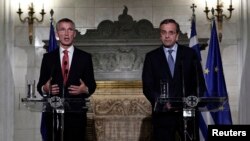NATO's new chief says the Euro-Atlantic alliance is facing "many challenges" from "many directions."
Speaking to reporters Thursday in Athens, after meeting with Greek Prime Minister Antonis Samaras, NATO Secretary General Jens Stoltenberg cited Russia’s actions in Ukraine and ISIS foreign fighters returning to Europe from the Middle East as threats to the alliance's security.
"Russia's actions in Ukraine are in breach of international law, they have severely damaged trust and they pose a major challenge to our Euro-Atlantic security," he said. "In the Middle East and in North Africa ISIS and all the extremist groups are spreading violence and instability. And the returning foreign fighters pose a risk to our own security. We face many different challenges in many ways and from many directions.''
Samaras said fully restoring a military partnership with Russia is currently not possible, but a "dialogue" with Moscow must continue.
"The restoration of full partnership in the framework of the NATO-Russia Council is not at present feasible," he said. "However, channels of communication with the Russian side must be kept open and along with the continuation of this political dialogue. We believe that for European security the participation of Russia is necessary, which with appropriate encouragement could become part of the solution.''
Earlier, Stoltenberg said NATO is increasing its readiness and air patrols in response to a spike in Russian military flights in European airspace.
He said the alliance is “strong" and “remains vigilant” in the face of increased Russian flights over the Baltic, North and Black seas, along NATO’s eastern borders.
Stoltenberg said, while NATO is not back on a Cold War footing, recent Russian military activity has “undermined a lot of trust."
The alliance said Wednesday more than two dozen Russian aircraft in four groups had been intercepted and tracked during the preceding 48 hours.
There have been more than 100 intercepts of Russian aircraft so far this year, three times more than in 2013.
Tensions between NATO and Russia have escalated since Russia annexed the Crimean Peninsula from Ukraine in March. NATO also accuses Moscow of supporting pro-Russian separatists in eastern Ukraine.
A NATO spokesman said Wednesday that Norwegian, British, Portuguese, German and Turkish fighters were sent up to intercept and identify the Russian planes, adding that such measures “are standard procedure when an unknown aircraft approaches NATO airspace.”
NATO's eastern members, including Poland and the Baltic states, have been particularly annoyed by Russian military activity. In response to their concerns, the U.S.-led alliance has increased the number of aircraft and personnel to monitor the airspace on a rotational basis.





